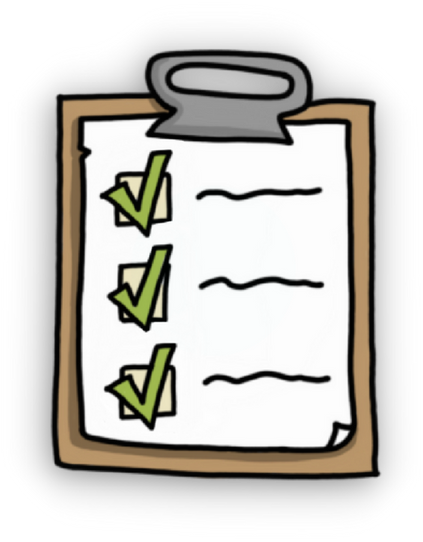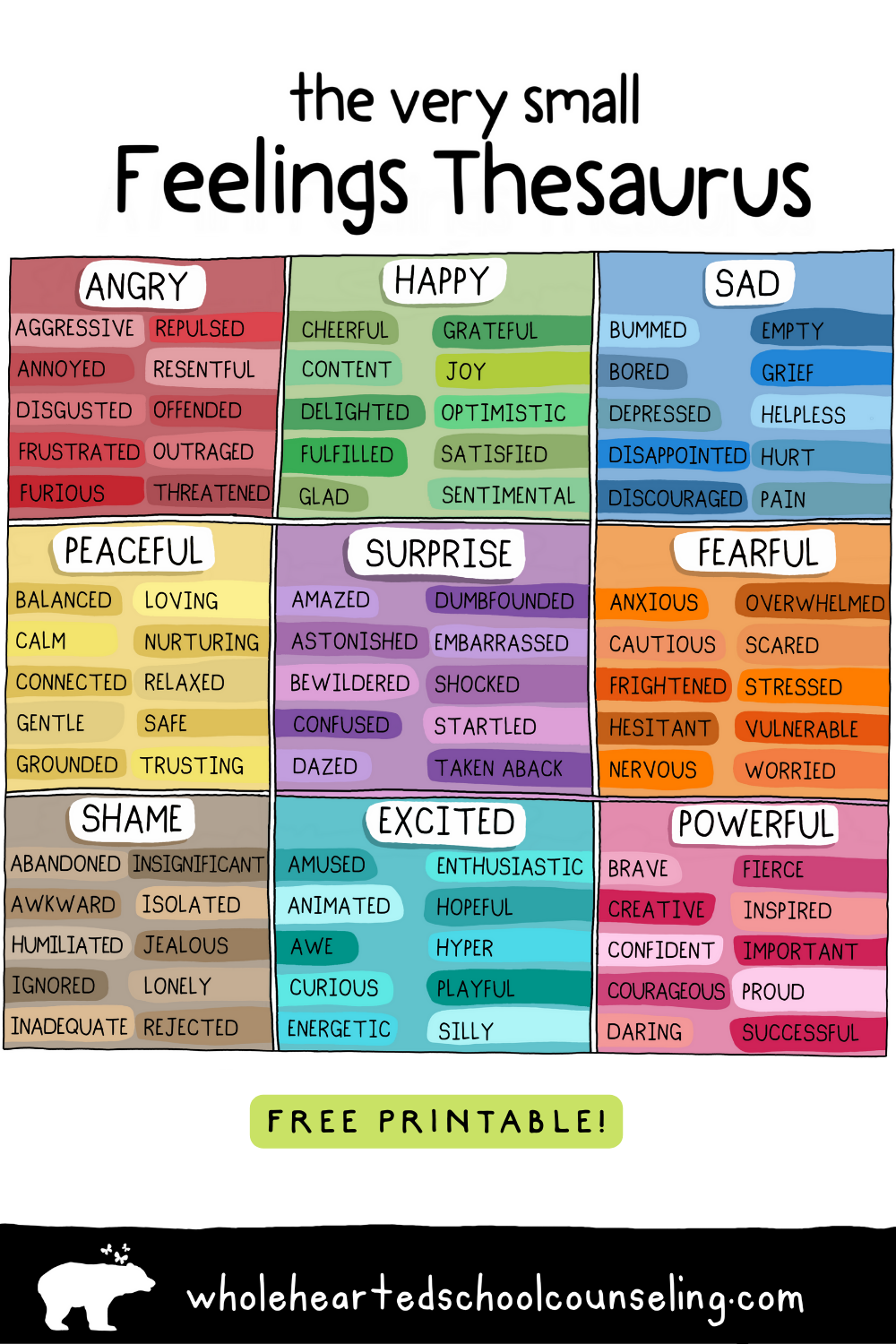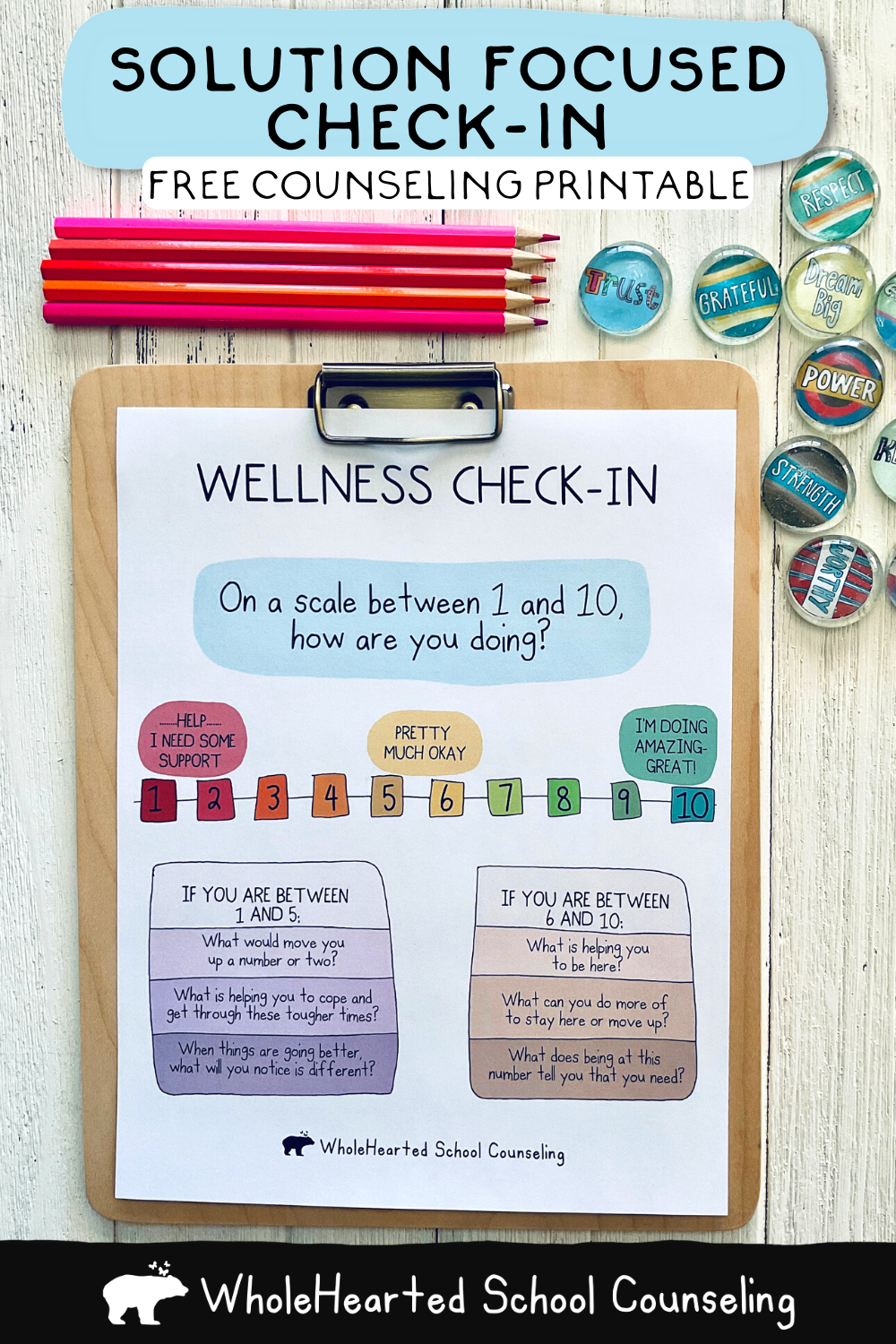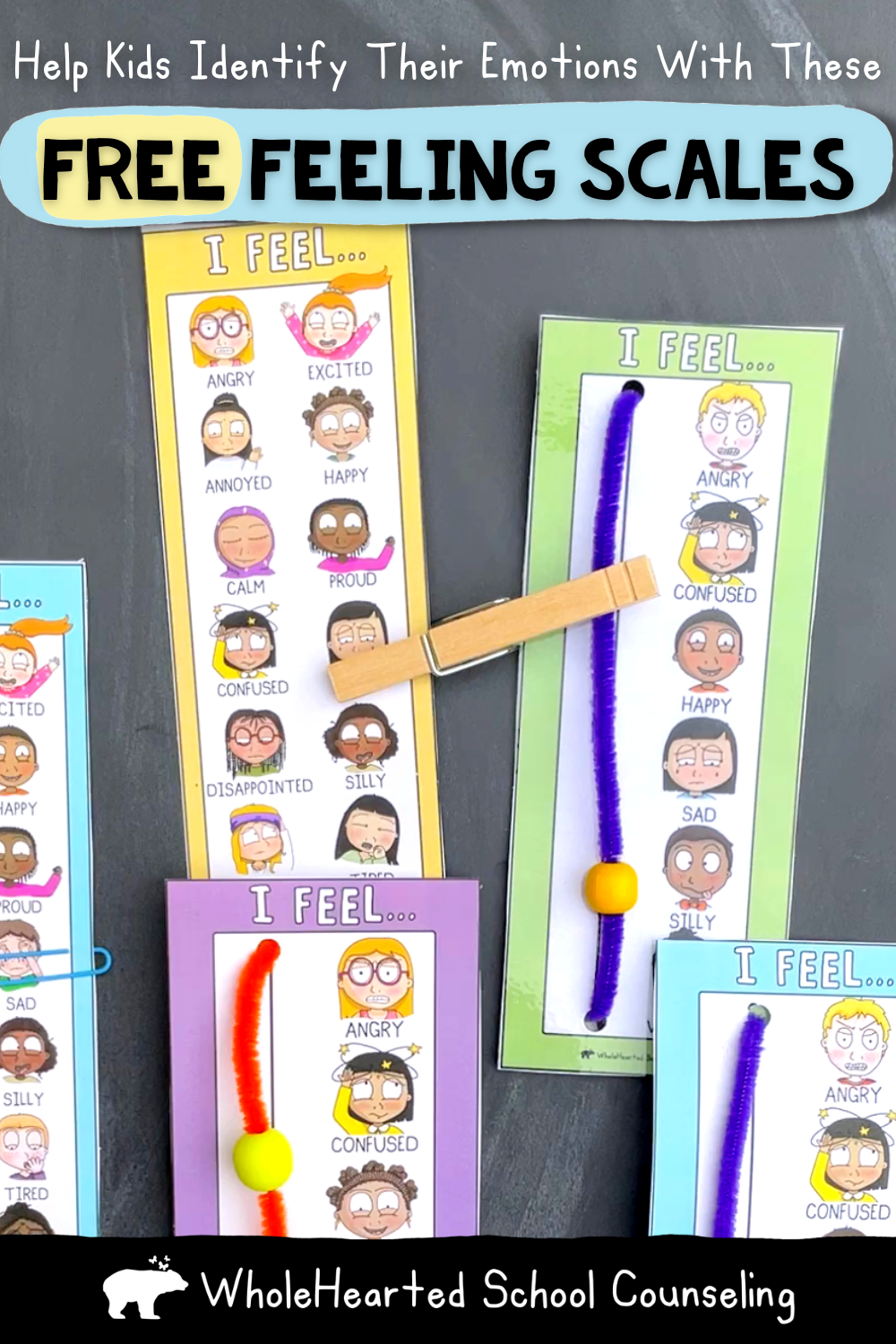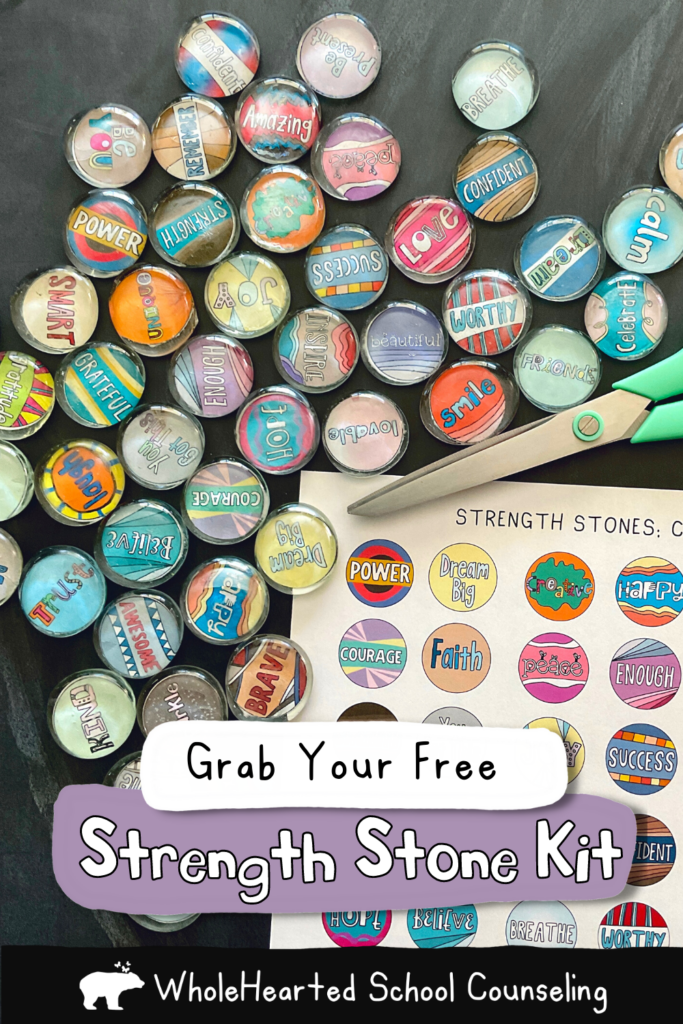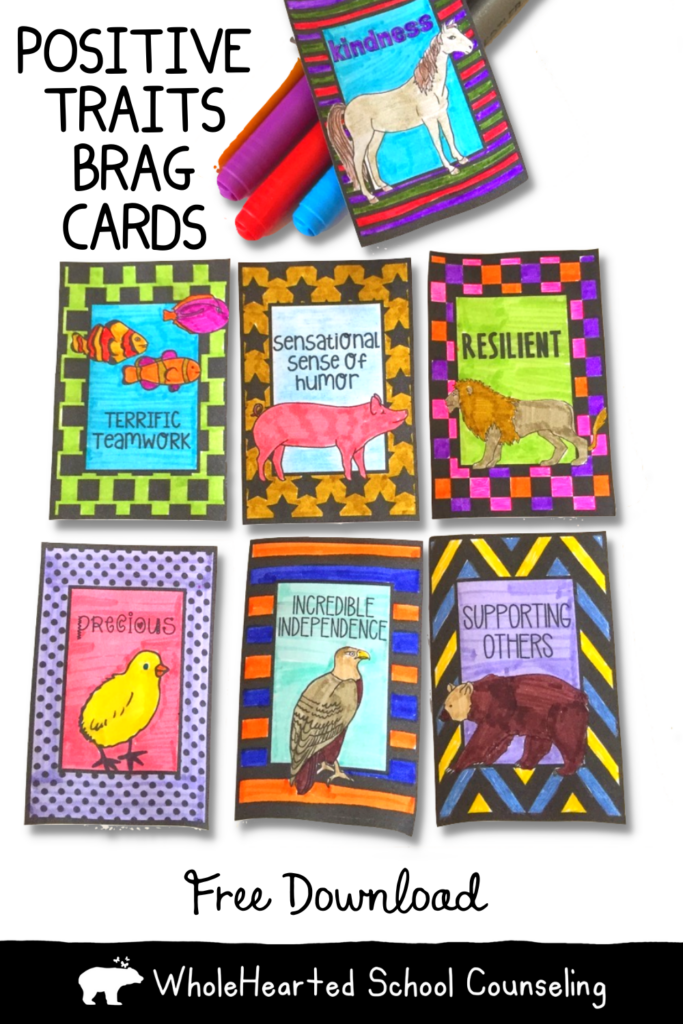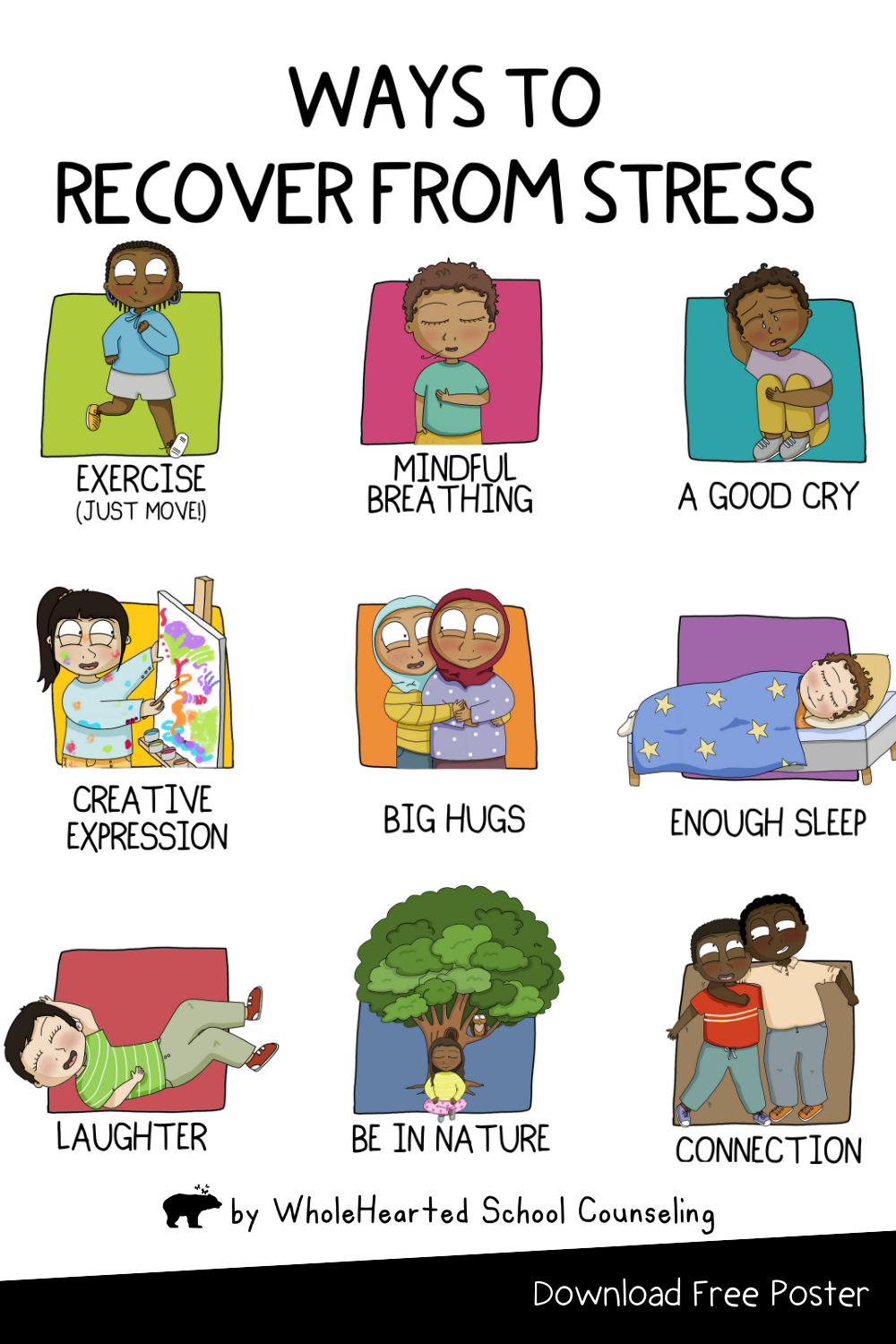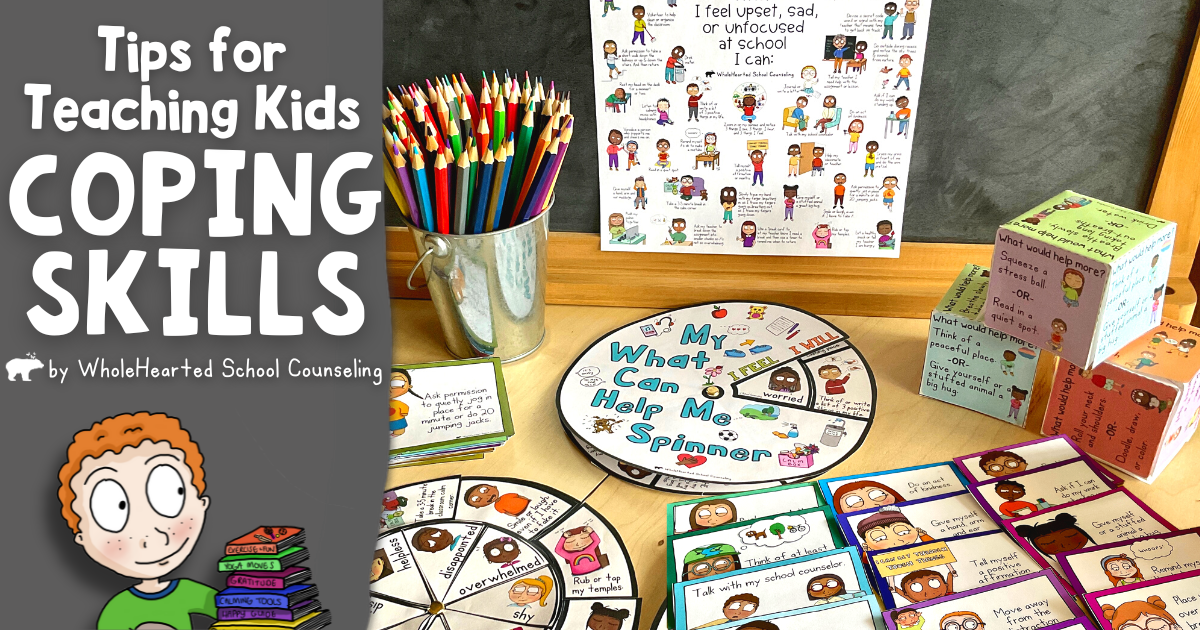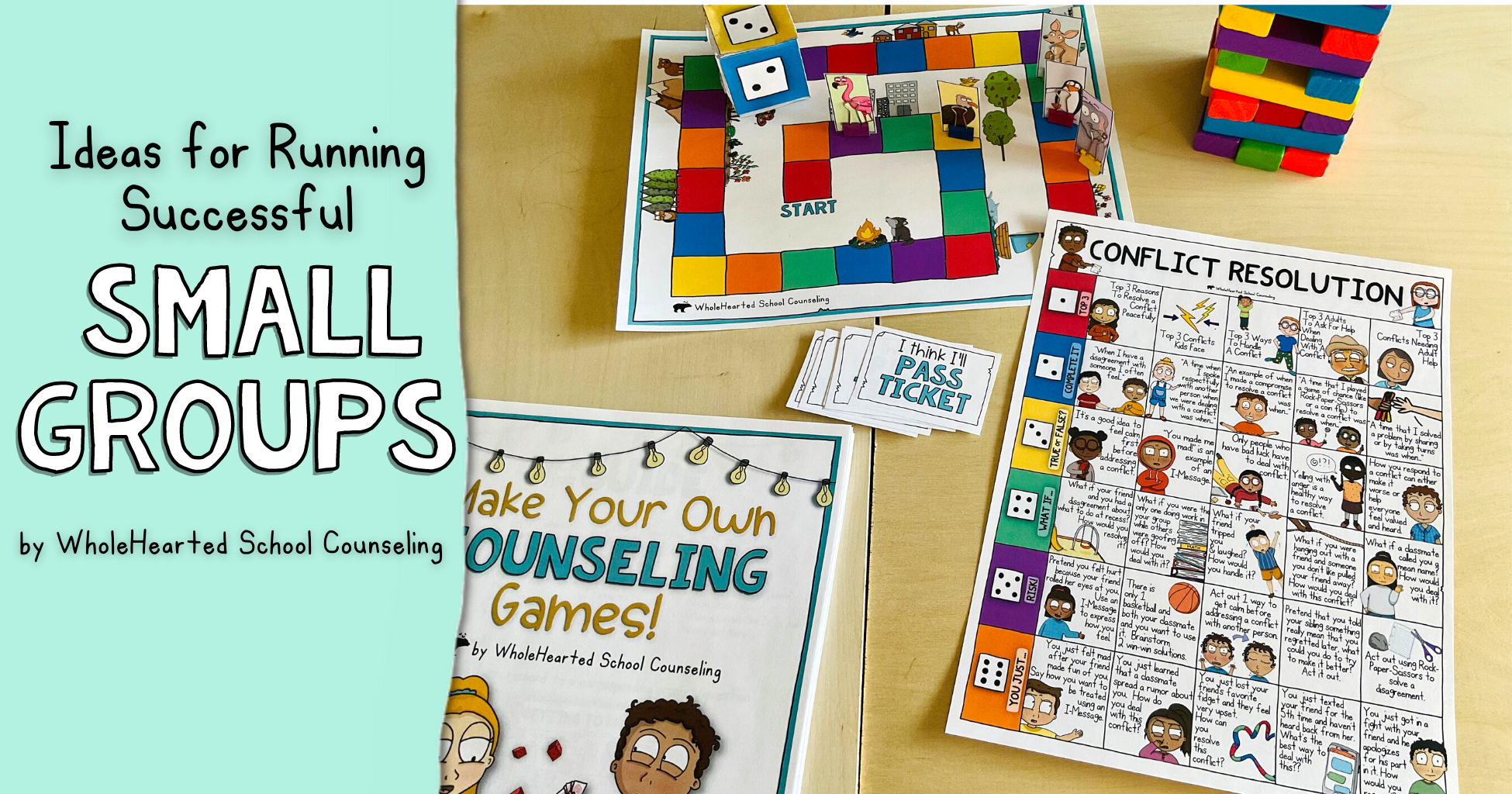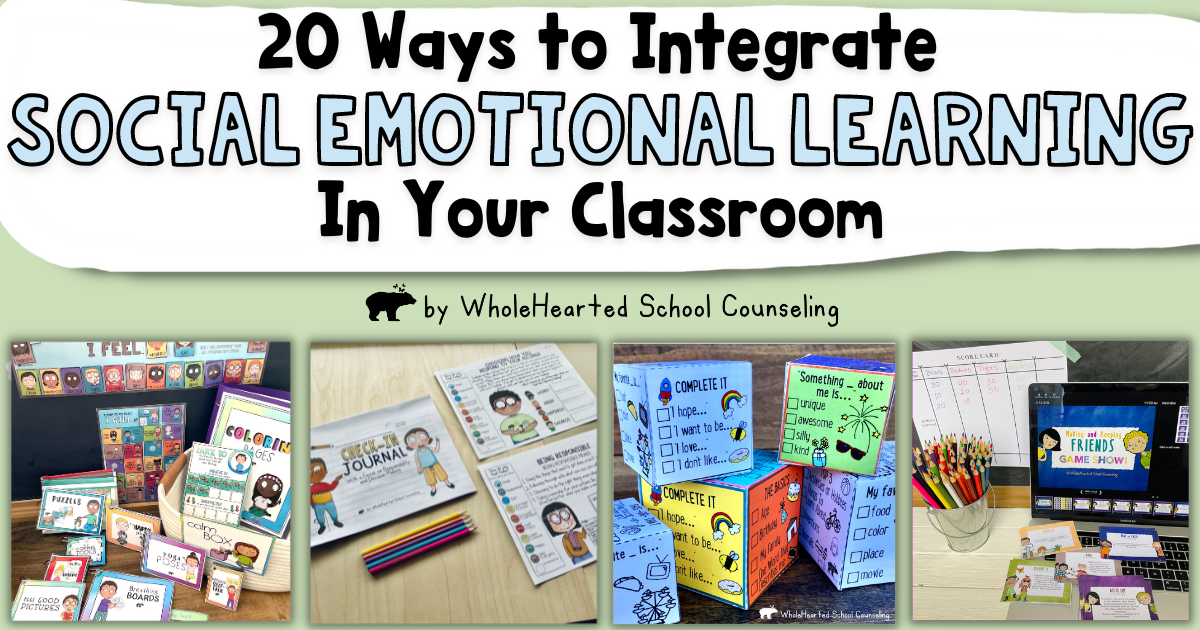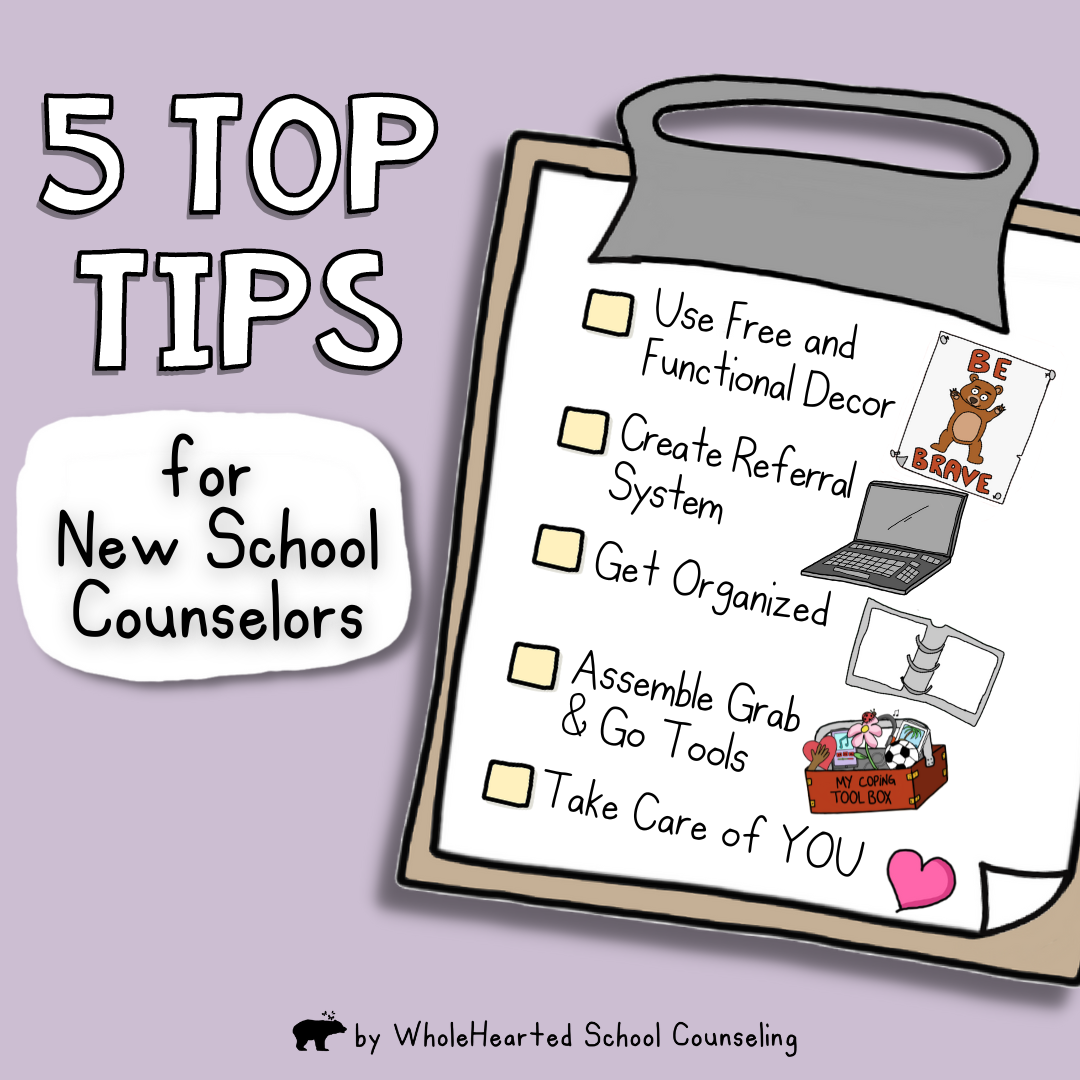
SCHOOL COUNSELING HACKS FOR THOSE NEW TO THE PROFESSION
You are entering the school counseling profession at the absolute perfect time! Now more than ever, communities are placing priority on mental health initiatives. And school counselors are leaders and driving forces in navigating this change.
School Counselors uniquely ROCK because of the specific training in this profession. In addition to supporting youth mental health with individual counseling, small group counseling, and whole group SEL or guidance lessons, school counselors also support the school community’s macro and micro systems, as well. Because of this, you are a valued and respected change agent. In short, there is no other job quite like yours.
This top tips for school counselors blog post is dedicated specifically to YOU, the first year counselor. So let’s talk about how to rock those fresh out of grad school ideas, while building your first school counseling program. And how to look like a pro doing it. So, first, give yourself a firework clap, a fist bump, and a big ole round of applause because…. YOU DID IT! Welcome to one of the very best professions that ever did exist: being a school counselor!
SCHOOL COUNSELING TIP #1
Decorate with Functional (and Free!) Decor
We’ve all been there, laying in bed in August, late night Pinterest surfing, looking for the perfect theme for your office decor this school year. Should I go with a cactus theme, floral, or keep it simple with polka-dots and shapes? Whatever you do decide, make your wall space matter by plastering up usable counseling tools as your decor.
My favorite is when a counseling office looks like a comfy living room. Which means a fun trip to find frames at the second hand store that can be repurposed. Just take out the 1980’s palm tree pictures, and replace them with posters that can be used as teaching tools.
Nearly every interaction that school counselors have with students includes feeling words. For this reason, hanging up a (totally free) Feelings Thesaurus eye level for your students would make an appealing and incredibly usable decor piece. Works as a great conversation starter and check-in with students. Plus, can be used across grade levels.
Working with students at all age levels, there seems to be a consistent struggle with positive self-talk. When kids get down on themselves, it can take a negative spiral and often results in a counselor intervention. It can be super helpful to have this freebie Challenge Automatic Negative Thoughts CBT poster available to redirect their thoughts, words, and actions. Visual supports like this can guide your questioning to support a more positive attitude in the moment and in the future.
Want more? Check out the Freebies section at my WholeHearted School Counseling store for numerous other school counseling poster ideas to best fit your age group and highest need topic areas. Take it a step further and share them with classroom teachers to hang in their rooms, too! I mean, what better way to start forming key relationships at your school than by gifting something that could be useful to others? Can act as a great conversation starter for you and your colleagues, too!
Check out some other free visual supports and functional decor you can download, print, and display right away in your counseling office right now!
TIP #2 FOR SCHOOL COUNSELORS
Create a Procedure for Staff and Student Self-Referral
Another helpful tip for school counselors is to create a school counseling referral procedure – and communicating that procedure – at the start of the school year. School counselors are out and about in the building – in hallways, at drop off, pick up, popping into the lunch room, etc. Your friendly and familiar face is recognizable and approachable to your staff and community. But, oftentimes this comes with – “Hey, I’ve been meaning to ask you….” hallway conversations that rarely make it to your daily documentation. Then the thought escapes you like butterflies fresh out of a cocoon and you are left having to go back to that person for reminders about their ask. (And sometimes you might just forget all together!)
Although this is not completely avoidable because no doubt everyone in a school building is working hard minute to minute. In other words, the hallway is quite literally one of the most convenient places to connect. In this case, you can have procedures in place to limit the hallway convos or have a place to redirect them.
For example: You can engage the conversation and then always end it with, “Will you please do me a favor and fill out the counselor referral? I have so much swimming in mind, I don’t want to forget to support you.” An an electronic referral using a secure Google or Microsoft Forms can often work best for teachers and staff.
Teacher and Staff Referrals
Request the following information, such as:
- Name of the Student (s)
- Today’s date
- Staff Member making the referral
- Please include a short description of the problem
- On a scale of 1 to 5, one is please get to this in the next day or two, and 5 is burning hot on fire, please get to this today, what is the severity of the problem?
It goes without saying to have a procedure that protects the privacy of all students, families and staff involved.
Student Self-Referrals
For a student referral, you can put together pencil boxes with this free Elementary School Counseling Student Self-Referral Form and a few pencils for each teacher in the building to place in their classroom. You can also place these forms outside your counseling office, too. Then during your introductory Meet the Counselor lesson, explain the self-referral form. Share with students when and how to use it, and how you will respond to the referrals. (Side note: this self-referral form is available in both English AND Spanish, too!)
When there are procedures in place, it’s easier to remain in control of your school counseling program in your building. Moreover, there is a natural checks and balances system to keep everyone accountable. Having this data as a leverage point for advocacy purposes in your school counseling program at the building and district level is key. It can also be a valuable piece of information when working with support services in determining potential interventions for students.
#3 SCHOOL COUNSELING TIP
Stay Organized From Day 1
Depending on your personality style, this tip for new school counselors might be easier said than done. Because it does take some prepping and routine commitment. But staying organized will help you work smarter, not harder, in the long run.
I heard once that teachers make on average over 1,500 decisions a day! And school counselors honestly, are no different. Like teachers, school counselors juggle tons of difficult decisions every single day. This level of on the spot quick thinking is no doubt something you truly can not adequately prepare for. So the next tip for school counselors is preventatively have solid and adaptable organizational strategies in place. This way, when you’re faced with making a decision, it’s not so overwhelming.
There are several amazing planners and calendars out there that you can purchase in craft stores, at a teacher supply store in your area, or found online, such as TPT. Find something that best fits the specific needs of school counseling and your personality, too! Sometimes this comes with a little trial and error.
If your school uses the Google platform, scheduling your whole group school counseling lessons, school counseling small groups, and individual counseling sessions with timers and reminders is a great place to start. You can sync this with your phone. This way, when you feel like you are being yanked in opposite directions by your fingertips, you stay on schedule. This will help you remain a constant for the students in your building.
If you are a paper and pencil kinda person (like me), having a physical planner or daily monitor sheet helps keep track of your everyday tasks in one place. Having a planner, notebook, or single sheet that you write down your phone calls, crisis/unplanned responsive services, daily lessons, and your to-do list helps when completing your use of time analysis, when attending student support meetings, or when logging contacts into your district’s platform.
SCHOOL COUNSELOR TIP #4
Create Quick Grab-and-Go School Counseling Resources
A student walks in crying while you are in the middle of a small group, a teacher calls and asks if a student can take a break while you are meeting with your support team about tier 2 interventions, or a teacher catches you in the hallway and asks for a quick idea to help with brain breaks. YOU ARE PREPARED for this!
Keeping a set of file folders near your office door that you and staff have quick access to makes you a pro from the get go! If you have a file cabinet in your room, dedicating one drawer to ready to go resources takes the panic out of crisis intervention and allows you the ability to respond with ease. Grab a stack of dividers and file folders from the office and label them with potential needs. Some example topics could be: Brain Breaks, Calming Tool Box, Conflict Resolution, Feelings Identification, Coping Skills, Anger Management, Healthy Self-Talk, etc. Then in each folder, put quick grab resources for when a student pops in with a specific need.
Like school counseling tip #3 (Stay Organized), this one takes some planning and prep work, too. Something to help with this is to make sure you keep a master copy of each file in the folder. This way you don’t have to search your computer the next time you need to make more copies of the school counseling resource.
For instance, download and print this free I Spy Coping Strategies. This is a great activity you can hand out to help students redirect heightened emotions and enforce positive coping skills. (Did I mention it was free?)
Or check out these free Feeling Scales that you can put in your Calming Tool Box or Feelings Identification folder as well. (Yup…the feelings scales are free, too!)
These Positive Traits Message Cards are great for Healthy Self-Talk because not only are they saying the language to themselves as they decorate, they are also creating something they can pass on to others. Or make these Strength Stones and Storytelling Stones and keep them in a ziplock baggies in the folders as well.
#5 TOP TIP FOR NEW SCHOOL COUNSELORS
Take Good, Kind Care of Yourself
I had such a hard time being present for my own family. And even for my own self. I seemed perfectly functional at work. (I mean as functional as anyone can be at their year in a new profession.). But at home, I would break down and well, not function so good.
Basically, what I was experiencing was secondary traumatic stress. Or the emotional pressure that can happen when you learn about the firsthand traumatic experiences of others. Given the nature of the school counseling profession, not sure if it’s possible to avoid secondary traumatic stress.

Luckily for me, I had an amazing school counselor mentor who shared a tip with me a few months into my new job that really helped me better cope with the stress. She suggested I close my eyes and visualize a door in my mind. Then to to imagine closing that door each time I arrived at home. Closing that door represented placing everything from work outside of it. A symbolic boundary-setting visualization.
And you know what? It really worked. So much so that even though I am no longer working in at a school, I often still use this trick for other stressful things.
Other ways to de-stress include:
- exercise (my favorite, time and tested coping tool)
- mindful breathing
- laughing
- crying
- connecting with others
- doing something creative
- getting enough sleep
- unplugging and spending time in nature
- getting a nice, big hug (at least for 12 seconds!)
As the metaphor goes, you got to put the oxygen mask on yourself first before you can care for anyone else, So remember to always take good, kind care of yourself. So that you can better rock on as the awesome school counselor that you are!





